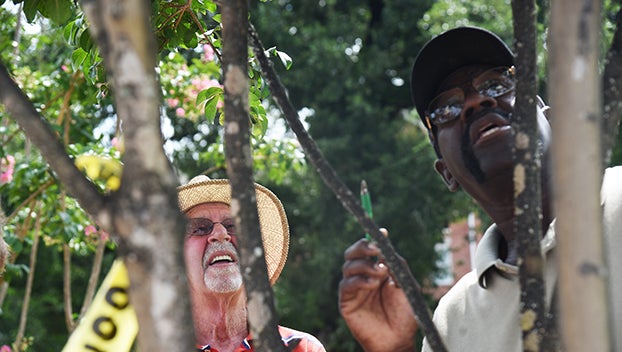Master gardeners join city in fight against crape myrtle bark scale
Published 12:14 am Tuesday, August 15, 2017

- Local master gardeners Bo Cedotal and Monroe Sago look at a downtown crape myrtle damage by bark scale. (Nicole Hester / The Natchez Democrat)
By Christian Coffman
NATCHEZ — The Adams County Master Gardeners and the City of Natchez are once again joining forces to combat the crape myrtle bark scale.
The disease that threatens Natchez’s signature crape myrtle trees is back, but master gardener Monroe Sago and Bo Cedotal say the infestation does not appear as large as in previous years thanks to work performed last year.
Last year, the group treated approximately 1,500 trees with an insecticide that has to be reapplied each year.
This week Sago and Cedotal will begin treating approximately 200 trees along the Natchez Bluff and throughout downtown.
Sago said the master gardeners would hand over the remaining work to the city.
“We’ll treat the ones that need to be treated and let the city handle the rest,” Sago said. “We are going for a group effort (with the city) this year.”
Natchez and surrounding areas have been dealing with the crape myrtle bark scale for the last two years when officials identified the disease in local trees.
What begins as a small bug, can quickly become a mass of white, felt-like scales covering entire branches.
The scales attach to the tree’s bark and secrete a sticky substance called honeydew that attracts a common fungus called sooty mold. The black mold can end up covering the tree and surrounding plants and inhibit the plant’s growth.
This mold works its way up to the branches so that the trees have trouble blooming, Sago said.
However, the pest does not affect every tree, Sago said.
He showed two trees growing next to each other on the bluff of the same age, but only one was crawling with the bugs associated with the infestation.
Though birds and the wind could carry the disease, Sago and Cedotal said officials from the local Mississippi Extension Service are not certain of the local source.
“We’re not sure where it came from, we just know that it has spread,” Cedotal said.
Even still, the gardeners are confident area trees will get the treatment they need.
“The treatment works, we just have some (trees) that are more immune than others,” Sago said.
Sago said an instructor from Mississippi State University would be visiting the local master gardeners to discuss the treatment and the apparent immunity that some trees exhibit.
Cedotal said that people with crape myrtle trees in their yards should treat their trees as well.
If help is needed, people can contact the master gardeners through the Mississippi Extension Service at 601-445-8202.






